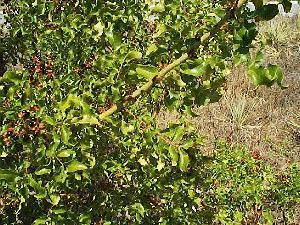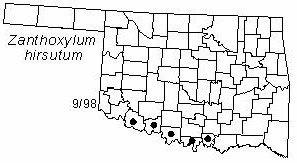
Large shrub or small tree to 5 m (15 ft) tall and 15 cm (6 in) diameter. Twigs light gray, hairy, with short sharp spines. Bark light gray or reddish-tan, smooth, thin, with sharp spines. Leaves pinnately compound, 2.5-10 cm (1-4 in) long, often with a few spines on the rachis. Leaflets 5-9, paired except at end, elliptical or ovate, 1-3 cm (0.4-1.2 in) long, undulate margined, usually finely hairy, shiny yellow-green above, paler below. Flowers small, greenish-white, numerous in branching clusters at ends of leafy twigs in early spring. Fruits numerous small follicles, maturing in early summer. Seeds shiny-black.
Distribution: The species is native to northeastern Mexico and southwestern Texas northward to the Red River valley in southern Oklahoma.
Habitat: understory of moist forests, fencerows.
Comment: Called "toothache tree" because chewing the bark or leaves produces numbness in the mouth and tongue and reduces the pain of toothache. In Love and Marshall counties, where the ranges of Z. clava-herculis and Z. hirsutum overlap, numerous plants are found which are intermediate between the species. These intermediates are assumed to be hybrids. Zanthoxylum means "yellow-wood"; hirsutum refers to the usually hairy leaves.
NWI status: none
Distribution in Oklahoma: 
BACK
NEXT
RETURN TO INDEX
Last update: 9/23/99
 Go to Oklahoma Biological Survey Home Page
Go to Oklahoma Biological Survey Home Page
 Disclaimer
Disclaimer